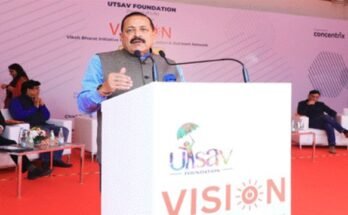The Union Minister of Finance and Corporate Affairs, Smt. Nirmala Sitharaman, presented the Union Budget 2024-25 in Parliament on 23 July 2024. This budget envisions sustained efforts across nine key priorities to generate ample opportunities for all, in pursuit of ‘Viksit Bharat.’ The key priorities include Productivity and Resilience in Agriculture, Employment & Skilling, Inclusive Human Resource Development and Social Justice, Manufacturing & Services, Urban Development, Energy Security, Infrastructure, Innovation, Research & Development, and Next Generation Reforms. Among these, significant announcements have been made in relation to the infrastructure sector.
Turning attention to the full year and beyond, the budget particularly focuses on employment, skilling, MSMEs, and the middle class. The Prime Minister’s package of 5 schemes and initiatives to facilitate employment, skilling and other opportunities for 4.1 crore youth over a 5-year period with a central outlay of INR 2 lakh crores was announced.
Implementation of schemes is meant for supporting economic activities by craftsmen, artisans, self-help groups, scheduled caste, schedule tribe and women entrepreneurs, and street vendors, such as PM Vishwakarma, PM SVANidhi, National Livelihood Missions, and Stand-Up India will be stepped up.
The government emphasizes a saturation approach to ensure all eligible individuals benefit from developmental programs. This approach aims to enhance capabilities and empower people through targeted interventions in education, health, and skill development. Programs like PM Vishwakarma, PM SVANidhi, National Livelihood Missions, and Stand-Up India are being intensified to support economic activities among craftsmen, artisans, self-help groups, Scheduled Castes, Scheduled Tribes, women entrepreneurs, and street vendors.
Adoption of technology will be stepped up towards digitalization of the economy.
SKILL DEVELOPMENT & EMPLOYMENT
Employment Linked Incentive:
The government will implement following 3 schemes for ‘Employment Linked Incentive’, as part of the Prime Minister’s package. These will be based on enrolment in the EPFO, and focus on recognition of first-time employees, and support to employees and employers.
- Scheme A: First Timers: This scheme will provide one-month wage to all persons newly entering the workforce in all formal sectors. The direct benefit transfer of one-month salary in 3 instalments to first-time employees, as registered in the EPFO, will be up to INR 15,000. The eligibility limit will be a salary of INR 1 lakh per month. The scheme is expected to benefit 210 lakh youth.
- Scheme B: Job Creation in manufacturing: This scheme will incentivize additional employment in the manufacturing sector, linked to the employment of first-time employees. An incentive will be provided at specified scale directly both to the employee and the employer with respect to their EPFO contribution in the first 4 years of employment. The scheme is expected to benefit 30 lakh youth entering employment, and their employers.
- Scheme C: Support to employers: This employer-focussed scheme will cover additional employment in all sectors. All additional employment within a salary of INR 1 lakh per month will be counted. The government will reimburse to employers up to INR 3,000 per month for 2 years towards their EPFO contribution for each additional employee. The scheme is expected to incentivize additional employment of 50 lakh persons.
Participation of women in the workforce:
Facilitating higher participation of women in the workforce through setting up of working women hostels in collaboration with industry, and establishing creches. In addition, the partnership will seek to organize women-specific skilling programmes, and promotion of market access for women SHG enterprises.
Skilling Programme:
A new centrally sponsored scheme has been announced, as the 4th scheme under the Prime Minister’s package, for skilling in collaboration with state governments and Industry under which 20 lakh youth will be skilled over a 5-year period. 1,000 Industrial Training Institutes will be upgraded in hub and spoke arrangements with outcome orientation. Course content and design will be aligned to the skill needs of industry, and new courses will be introduced for emerging needs.
Skilling Loans:
The Model Skill Loan Scheme will be revised to facilitate loans up to INR 7.5 lakh with a guarantee from a government promoted Fund. This measure is expected to help 25,000 students every year.
Services to Labour:
The government will facilitate the provision of a wide array of services to labour, including those for employment and skilling. A comprehensive integration of e-shram portal with other portals will facilitate such one-stop solution. Open architecture databases for the rapidly changing labour market, skill requirements and available job roles, and a mechanism to connect job-aspirants with potential employers and skill providers will be covered in these services.
Rural Development and Infrastructure:
The budget provides an allocation of ₹2.66 lakh crore for rural development, including rural infrastructure projects. This allocation aims to enhance the quality of life in rural areas through improved connectivity, healthcare, education, and economic opportunities.
Critical Mineral Mission:
Critical Mineral Mission will be set up for domestic production, recycling of critical minerals, and overseas acquisition of critical mineral assets. Its mandate will include technology development, skilled workforce, extended producer responsibility framework, and a suitable financing mechanism.
India is a world leader in the diamond cutting and polishing industry, which employs a large number of skilled workers. To further promote the development of this sector, we would provide for safe harbour rates for foreign mining companies selling raw diamonds in the country.
– Union Minister of Finance and Corporate Affairs, Smt. Nirmala Sitharaman
Skilling Programme and Upgradation of Industrial Training Institutes
- 1000 Industrial Training Institutes (ITIs) to be upgraded in hub and spoke arrangements in five years New Centrally Sponsored Scheme in collaboration with states and industry
- Focus on outcome and quality of skilling
- Course content and design aligned to needs of industry
- Total outlay of INR 60,000 crore over five years
- Government of India—INR 30,000 crore
- State Governments—INR 20,000 crore
- Industry—INR 10,000 crore (including CSR funding)
- 200 hubs and 800 spoke ITIs –all with industry collaboration
- Re-design and review of existing courses
- New courses
- 1 to 2 year courses in all 1000 ITIs
- Short term specialized courses in Hub ITIs
- Capacity augmentation of 5 national institutes for training of trainers
- 20 lakh students expected to benefit
EDUCATION
Education Loans:
For helping our youth who have not been eligible for any benefit under government schemes and policies, a financial support for loans upto INR 10 lakh for higher education in domestic institutions has been announced. E-vouchers for this purpose will be given directly to 1 lakh students every year for annual interest subvention of 3 per cent of the loan amount.
Saturation approach:
For achieving social justice comprehensively, the saturation approach of covering all eligible people through various programmes including those for education and health will be adopted to empower them by improving their capabilities
MSMEs & START-UPS
Support for promotion of MSMEs:
This budget provides special attention to MSMEs and manufacturing, particularly labour-intensive manufacturing. We have formulated a package covering financing, regulatory changes and technology support for MSMEs to help them grow and also compete globally, as mentioned in the interim budget. I am happy to announce the following specific measures.
Credit Guarantee Scheme for MSMEs in the Manufacturing Sector:
For facilitating term loans to MSMEs for purchase of machinery and equipment without collateral or third-party guarantee, a credit guarantee scheme will be introduced. The scheme will operate on pooling of credit risks of such MSMEs. A separately constituted self-financing guarantee fund will provide, to each applicant, guarantee cover up to INR 100 crore, while the loan amount may be larger. The borrower will have to provide an upfront guarantee fee and an annual guarantee fee on the reducing loan balance.
New assessment model for MSME credit:
Public sector banks will build their in-house capability to assess MSMEs for credit, instead of relying on external assessment. They will also take a lead in developing or getting developed a new credit assessment model, based on the scoring of digital footprints of MSMEs in the economy. This is expected to be a significant improvement over the traditional assessment of credit eligibility based only on asset or turnover criteria. That will also cover MSMEs without a formal accounting system.
Credit Support to MSMEs during Stress Period:
A new mechanism has been announced for facilitating continuation of bank credit to MSMEs during their stress period. While being in the ‘special mention account’ (SMA) stage for reasons beyond their control, MSMEs need credit to continue their business and to avoid getting into the NPA stage. Credit availability will be supported through a guarantee from a government promoted fund.
Mudra Loans:
The limit of Mudra loans will be enhanced to ₹ 20 lakh from the current ₹ 10 lakh for those entrepreneurs who have availed and successfully repaid previous loans under the ‘Tarun’ category.
Enhanced scope for mandatory onboarding in TReDS:
For facilitating MSMEs to unlock their working capital by converting their trade receivables into cash, I propose to reduce the turnover threshold of buyers for mandatory onboarding on the TReDS platform from INR 500 crore to INR 250 crore. This measure will bring 22 more CPSEs and 7000 more companies onto the platform. Medium enterprises will also be included in the scope of the suppliers.
SIDBI branches in MSME clusters:
SIDBI will open new branches to expand its reach to serve all major MSME clusters within 3 years, and provide direct credit to them. With the opening of 24 such branches this year, the service coverage will expand to 168 out of 242 major clusters.
MSME Units for Food Irradiation, Quality & Safety Testing:
Financial support for setting up of 50 multi-product food irradiation units in the MSME sector will be provided. Setting up of 100 food quality and safety testing labs with NABL accreditation will be facilitated.
E-Commerce Export Hubs:
To enable MSMEs and traditional artisans to sell their products in international markets, E-Commerce Export Hubs will be set up in public private-partnership (PPP) mode . These hubs, under a seamless regulatory and logistic framework, will facilitate trade and export related services under one roof.
Digital Public Infrastructure Applications:
Turning to the services sector, development of DPI applications at population scale for productivity gains, business opportunities, and innovation by the private sector. These are planned in the areas of credit, e-commerce, education, health, law and justice, logistics, MSME, services delivery, and urban governance.
Shram Suvidha & Samadhan Portal:
Shram Suvidha and Samadhan portals will be revamped to enhance ease of compliance for industry and trade.
Financial sector vision and strategy:
For meeting financing needs of the economy, the government will bring out a financial sector vision and strategy document to prepare the sector in terms of size, capacity and skills. This will set the agenda for the next 5 years and guide the work of the government, regulators, financial institutions and market participants.
For Vegetable production & Supply Chains:
Large scale clusters for vegetable production will be developed closer to major consumption centres. There will be focus on promoting Farmer-Producer Organizations (FPOs), cooperatives and start-ups for vegetable supply chains including for collection, storage, and marketing.
To bolster the Indian start-up eco-system, boost the entrepreneurial spirit and support innovation, the Finance Minister Sitharaman proposed to abolish the so called angel tax for all classes of investors.
– Union Minister of Finance and Corporate Affairs, Smt. Nirmala Sitharaman
Internship in Top Companies
- One crore youth to be skilled by India’s top companies in five years.
- Twelve months Prime Minister’s Internship with monthly allowance of INR 5,000
- Applicable to those who are not employed and not engaged in full time education.
- Youth aged between 21 and 24 will be eligible to apply.
- Cost sharing (per annum):
- Government – INR 54,000 towards monthly allowance (plus INR 6,000 grant for incidentals)
- Company – Rs 6,000 from CSR funds towards monthly allowance
- Training cost to be borne by the Company from CSR funds.
- Administrative costs to be borne by respective parties (for the Company, reasonable administrative expenses can be counted as CSR expenditure)
- Participation of companies is voluntary
- Applications through an online portal
- Company to select from a short list; short listing based on objective criteria with emphasis on those with lower employability
- Ineligible candidates (indicative list)
- Candidate has IIT, IIM, IISER, CA, CMA etc as qualification
- Any member of the family is assessed to Income Tax
- Any member of the family is a government employee, etc.
- Company is expected to provide the person an actual working experience on a skill in which the company is directly involved.
- At least half the time should be in actual working experience/job environment, not in classroom.
- In case the Company cannot directly do so, it must tie-up with:
- Companies in its forward and backward supply chain (e.g. suppliers or customers) or
- Other Companies/Institutions in its Group or otherwise
- Will be co-ordinated with State Government initiatives wherever applicable.
- Phase 1 of the scheme will be for 2 years followed by Phase 2 for 3 years
- Note: Details of the schemes are subject to modification during the process of appraisal and approval.
The Budget 2024-25 Highlights have been taken from https://www.indiabudget.gov.in/doc/Budget_Speech.pdf
Read Interim Budget Update, Click Here



